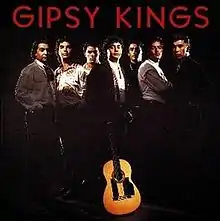Gipsy Kings (album)
Gipsy Kings is the third album by the French Rumba Catalana band Gipsy Kings, which was released in 1987. The album was their first to reach a worldwide audience, going gold across France, the UK, USA and other countries. The US and European versions of this album are identical except in some cases the song order may differ. The Japanese version released in 1995 includes an alternate version of "Vamos A Bailar" from their latest albums. The song "Inspiration" from this album famously appeared in the season five episode of Miami Vice, "World Of Trouble", in June 1988.
| Review scores | |
|---|---|
| Source | Rating |
| Allmusic | |
| The Encyclopedia of Popular Music | |
| Gipsy Kings | ||||
|---|---|---|---|---|
 | ||||
| Studio album by | ||||
| Released | August 21, 1987 | |||
| Recorded | 1986–87 | |||
| Genre | Rumba Catalana, Flamenco | |||
| Length | 43:45 | |||
| Label | Elektra Records | |||
| Gipsy Kings chronology | ||||
| ||||
Track listing
| No. | Title | Writer(s) | Length |
|---|---|---|---|
| 1. | "Bamboléo" | T. Baliardo, J. Bouchikhi, N. Reyes, S. Díaz | 3:25 |
| 2. | "Tú Quieres Volver" | Gipsy Kings | 3:15 |
| 3. | "Moorea" (Instrumental) | Gipsy Kings | 4:05 |
| 4. | "Bem, Bem, María" | Gipsy Kings | 3:03 |
| 5. | "Un Amor" | Gipsy Kings, Los Reyes | 3:40 |
| 6. | "Inspiration" (Instrumental) | Gipsy Kings | 3:28 |
| 7. | "A Mi Manera (Comme D'Habitude)" (cover of "My Way") | G. Thibault, C. Francois, J. Revaux | 3:52 |
| 8. | "Djobi Djoba" | Gipsy Kings, Los Reyes | 3:27 |
| 9. | "Faena" (Instrumental) | T. Baliardo, J. Bouchikhi, N. Reyes | 3:45 |
| 10. | "Quiero Saber" | Gipsy Kings | 4:10 |
| 11. | "Amor, Amor" | Gipsy Kings | 3:13 |
| 12. | "Duende" (Instrumental) | Gipsy Kings | 4:22 |
Japanese Bonus Tracks
| No. | Title | Length |
|---|---|---|
| 13. | "Vamos A Bailar" | 3:59 |
Personnel
- Gipsy Kings
- Nicolas Reyes — lead vocals, rhythm guitar
- Tonino Baliardo — lead and rhythm guitars
- André Reyes — rhythm guitar, backing vocals
- Jacques "Max" Baliardo — rhythm guitar
- Jahloul "Chico" Bouchikhi — rhythm guitar, handclaps
- Maurice "Diego" Baliardo — rhythm guitar, handclaps
- Paul "Pablo" Reyes — rhythm guitar
- Additional Personnel
- Dominique Perrier — synthesizer; arrangements (tracks 1, 3, 5, 12)
- Gerard Prévost — bass, synthesizer; arrangements (tracks 2, 4, 6—9, 10, 11)
- Claude Salmieri — drums
- Marc Chantereau — percussion
Charts and certifications
Chart performanceWeekly charts
Year-End charts
|
Sales and certifications
| ||||||||||||||||||||||||||||||||||||||||||||||||||
References
- https://www.allmusic.com/album/r99718
- Larkin, Colin (2011). The Encyclopedia of Popular Music. Omnibus Press. ISBN 9780857125958. Retrieved 13 July 2019.
- "GIPSY KINGS - GIPSY KINGS (ALBUM)" (in French). lescharts.com. 2012. Retrieved 14 November 2012.
- "ARIA Charts - End Of Year Charts - Top 50 Albums 1989". Australian Recording Industry Association. 1989. Archived from the original on 11 June 2011. Retrieved 14 November 2012.
- "Aria Album Charts - 1989". Aria Charts. Retrieved 23 June 2019.
- "Canadian album certifications – Gipsy Kings – Gipsy Kings". Music Canada.
- "French album certifications – Gipsy Kings – Nouvel Album" (in French). InfoDisc. Select GIPSY KINGS and click OK.
- "Les Albums Platine :" (in French). Infodisc.fr. Archived from the original on 2013-04-12. Retrieved 2013-03-16.
- "RIAJ > The Record > July 2001 > Page 8 > Certified Awards (May 2001)" (PDF). Recording Industry Association of Japan (in Japanese). Archived from the original (PDF) on 2013-09-28. Retrieved 2013-08-21.
- Tenente, Fernando (April 14, 1990). "INTERNATIONAL: Floyd, Kaoma Top Sellers In Portugal Certs" (PDF). Billboard. Vol. 102 no. 15. p. 69. Retrieved November 28, 2020 – via World Radio History.
- "The Official Swiss Charts and Music Community: Awards (Gipsy Kings; 'Gipsy Kings')". IFPI Switzerland. Hung Medien.
- "British album certifications – Gipsy Kings – Gipsy Kings". British Phonographic Industry. Select albums in the Format field. Select Gold in the Certification field. Type Gipsy Kings in the "Search BPI Awards" field and then press Enter.
- "American album certifications – Gipsy Kings – Gipsy Kings". Recording Industry Association of America. If necessary, click Advanced, then click Format, then select Album, then click SEARCH.
External links
- Gipsy Kings at Discogs
- Gipsy Kings at gipsykings.net
Singles
- Bamboléo (31 March 1988)
- Djobi Djoba (25 October 1988)
- Bem, Bem, Maria (25 February 1989)
- Un Amor (29 July 1989)
- Tu Quieres Volver (26 September 1989)
- A Mi Manera (December 1989)
This article is issued from Wikipedia. The text is licensed under Creative Commons - Attribution - Sharealike. Additional terms may apply for the media files.